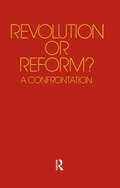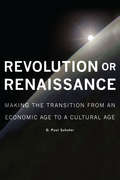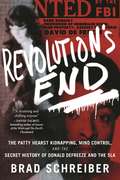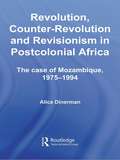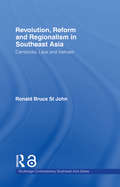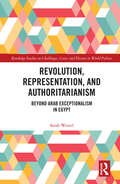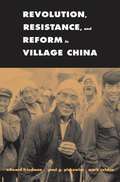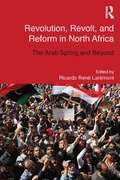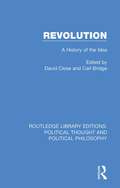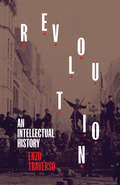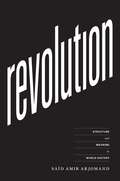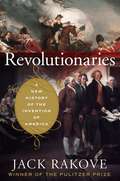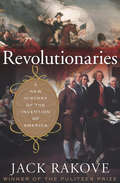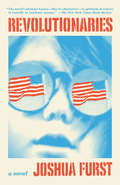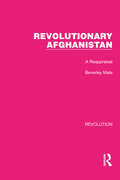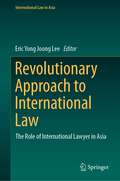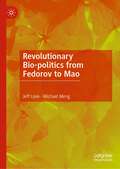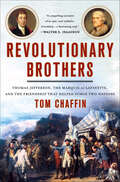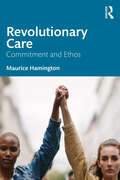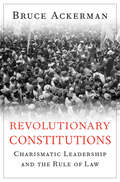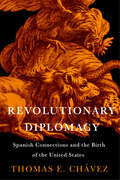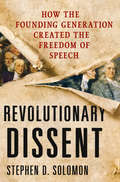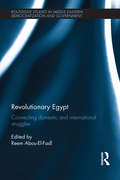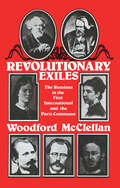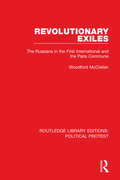- Table View
- List View
Revolution or Reform?: A Confrontation
by Herbert Marcuse Thomas MolnarThis series provides a forum for the critical review of enduring issues concerning ethics and society. The text of the debate between Herbert Marcuse and Sir Karl Popper which follows in this volume raises many important issues. The crucial issues between the two participants are (1) their anthropological-axiological positions with respect to the “nature” of man, society, and the practical functions of democracy as a mode of self-government; (2) the conceptions of science and of philosophy which lie behind each thinker’s claims with respect to these; and (3) their respective conceptions of the means required and feasible for attaining their respective social goals. The remarks which follow will attempt to focus upon, and deal critically with, the problems implicit in these three areas.
Revolution or Renaissance: Making the Transition from an Economic Age to a Cultural Age (Governance Series)
by D. Paul SchaferIn Revolution or Renaissance, D. Paul Schafer subjects two of the most powerful forces in the world – economics and culture – to a detailed and historically sensitive analysis. He argues that the economic age has produced a great deal of wealth and unleashed tremendous productive power; however, it is not capable of coming to grips with the problems threatening human and non-human life on this planet. After tracing the evolution of the economic age from the publication of Adam Smith's The Wealth of Nations in 1776 to the present, he turns his attention to culture, examining it both as a concept and as a reality. What emerges is a portrait of the world system of the future where culture is the central focus of development. According to Schafer, making the transition from an economic age to a cultural age is imperative if global harmony, environmental sustainability, economic viability, and human well-being are to be achieved.
Revolution's End: The Patty Hearst Kidnapping, Mind Control, and the Secret History of Donald DeFreeze and the SLA
by Brad SchreiberForty years after the Patty Hearst "trial of the century," people still don't know the true story of the events.Revolution's End fully explains the most famous kidnapping in US history, detailing Patty Hearst's relationship with Donald DeFreeze, known as Cinque, head of the Symbionese Liberation Army. Not only did the heiress have a sexual relationship with DeFreeze while he was imprisoned; she didn't know he was an informant and a victim of prison behavior modification.Neither Hearst nor the white radicals who followed DeFreeze realized that he was molded by a CIA officer and allowed to escape, thanks to collusion with the California Department of Corrections. DeFreeze's secret mission: infiltrate and discredit Bay Area anti-war radicals and the Black Panther Party, the nexus of seventies activism. When the murder of the first black Oakland schools superintendent failed to create an insurrection, DeFreeze was alienated from his controllers and decided to become a revolutionary, since his life was in jeopardy.Revolution's End finally elucidates the complex relationship of Hearst and DeFreeze and proves that one of the largest shootouts in US history, which killed six members of the SLA in South Central Los Angeles, ended when the LAPD set fire to the house and incinerated those six radicals on live television, nationwide, as a warning to American leftists.
Revolution, Counter-Revolution and Revisionism in Postcolonial Africa: The Case of Mozambique, 1975-1994 (Routledge Studies in Modern History #Vol. 3)
by Alice DinermanThis groundbreaking study investigates defining themes in the field of social memory studies as they bear on the politics of post-Cold-War, post-apartheid Southern Africa. Alice Dinerman offers a detailed chronicle of the Mozambican government’s attempts to revise the country's troubled postcolonial past with a view to negotiating the political challenges posed by the present. In doing so, she lays bare the path-dependence of memory practices, while tracing their divergent trajectories, shifting meanings and varied combinations within ruling discourse and performance. Central themes include: the interplay between past and present the dialectic between remembering and forgetting the dynamics between popular and official memory discourses the politics of acknowledgement. Dinerman’s original analysis is essential reading for students of modern Africa, the sociology of memory, Third World politics and post-conflict societies.
Revolution, Reform and Regionalism in Southeast Asia: Cambodia, Laos and Vietnam (Routledge Contemporary Southeast Asia Series #Vol. 8)
by Ronald Bruce St JohnBased on research carried out over the three decades, this book compares the post-war political economies of Cambodia, Laos and Vietnam in the context of their individual and collective impact on contemporary efforts at regional integration. The author highlights the different paths to reform taken by the three neighbours and the effect this has had on regional plans for economic development through the ASEAN and the Greater Mekong Subregion. Through its comparative analysis of the reforms implemented by Cambodia, Laos and Vietnam over the last thirty years, the book draws attention to parallel themes of continuity and change. The author discusses how the three states have demonstrated related characteristics whilst at the same time making different modifications in order to exploit the unique strengths of their individual cultures. Contributing to the contemporary debate over the role of democratic reform in promoting economic development, the book provides a detailed account of the political economies of three states at the heart of Southeast Asia.
Revolution, Representation, and Authoritarianism: Beyond Arab Exceptionalism in Egypt (Routledge Studies on Challenges, Crises and Dissent in World Politics)
by Sarah WesselThis book examines Egypt’s turbulent and contradictory political period (2011-2015) as key to understanding contemporary politics in the country and the developments in the Arab region after the mass protests in 2010/11, more broadly. In doing so, it breaks new ground in the study of political representation, providing analytical innovation to the study of disenchantment with politics, democracy fatigue and social cohesion. Based on five years of intense fieldwork, the author provides rare insights into local and national ideas on politics, justice and identity, and on how people situate themselves and Egypt in the regional and global context. It analyzes how the creation of an alternate, political system was discussed and negotiated among the Egyptian population, the military, the government, public figures, the media, and international actors, and yet nevertheless today, Egypt has a new political regime that is the most repressive in the countries’ modern history. Finally, it recalls the emotions and perceptions of individuals and collectives and interlinks these local perspectives to national events and developments through time. This book will be of key interest to scholars and students of democratization and authoritarianism, Middle East Studies, political representation and informality, collective action, and more broadly to cultural studies and international relations.
Revolution, Resistance, and Reform in Village China
by Edward Friedman Mark Selden Paul G. PickowiczDrawing on more than a quarter century of field and documentary research in rural North China, this book explores the contested relationship between village and state from the 1960s to the start of the twenty-first century. The authors provide a vivid portrait of how resilient villagers struggle to survive and prosper in the face of state power in two epochs of revolution and reform. Highlighting the importance of intra-rural resistance and rural-urban conflicts to Chinese politics and society in the Great Leap and Cultural Revolution, the authors go on to depict the dynamic changes that have transformed village China in the post-Mao era. This book continues the dramatic story in the authors' prizewinningChinese Village, Socialist State. Plumbing previously untapped sources, including interviews, archival materials, village records and unpublished memoirs, diaries and letters, the authors capture the struggles, pains and achievements of villagers across three generations of social upheaval.
Revolution, Revolt and Reform in North Africa: The Arab Spring and Beyond (Routledge Studies in Middle Eastern Democratization and Government)
by Ricardo René LarémontProviding an account of the recent revolutions or reform movements that constituted part of the Arab Spring, this book focuses on these transformative processes in a North African context. Whilst the longer term outcomes of the Arab Spring revolts are not entirely clear, the revolutionary or reform processes in North Africa are further along than the events taking place in Levant or the Arabian Peninsula, elections having now been held in the post-revolutionary/ post-revolt states. Understanding and examining North African events has become critical as the countries in question are part of Mare Nostrum; events in North Africa inevitably have effects in Europe. Using examples from Tunisia, Egypt, Libya, Morocco and Algeria, Revolution, Revolt and Reform in North Africa provides an insider scholar’s account of these recent revolutions or reform movements. One of the first attempts at undertaking an analysis of possible transitions to democracy in the region, this book is a valuable resource for students and researchers with an interest in the Middle East, Political Science or contemporary affairs in general.
Revolution: A History of the Idea (Routledge Library Editions: Political Thought and Political Philosophy #14)
by Carl Bridge David CloseFirst published in 1985. Revolution has been often defined, often abused as a descriptive term for elements of the political process. This book analyses the concept of revolution, and discusses ways in which this concept has changed from Aristotle to the late twentieth-century. The historical circumstances which have shaped the idea and caused it to change are outlined. Special attention is given to the Marxist tradition and to modernisation theory. The case studies comprise the Soviet Union since the Bolshevik Revolution, Nazi Germany 1933-45, China from about 1920, the struggle for political independence and economic development in Guinea-Bissau since the 1950s and the significance of the 1968 explosion in France. This book is intended for undergraduate students of history and politics. The emphasis is placed on the interpretation of political events and ideas. The book also seeks to introduce the vital contribution that can be made to the study of revolution by other disciplines like sociology and philosophy.
Revolution: An Intellectual History
by Enzo TraversoA cultural and intellectual balance-sheet of the twentieth century's age of revolutionsThis book reinterprets the history of nineteenth and twentieth-century revolutions by composing a constellation of "dialectical images": Marx's "locomotives of history," Alexandra Kollontai's sexually liberated bodies, Lenin's mummified body, Auguste Blanqui's barricades and red flags, the Paris Commune's demolition of the Vendome Column, among several others. It connects theories with the existential trajectories of the thinkers who elaborated them, by sketching the diverse profiles of revolutionary intellectuals--from Marx and Bakunin to Luxemburg and the Bolsheviks, from Mao and Ho Chi Minh to José Carlos Mariátegui, C.L.R. James, and other rebellious spirits from the South--as outcasts and pariahs. And finally, it analyzes the entanglement between revolution and communism that so deeply shaped the history of the twentieth century. This book thus merges ideas and representations by devoting an equal importance to theoretical and iconographic sources, offering for our troubled present a new intellectual history of the revolutionary past.
Revolution: Structure and Meaning in World History
by Saïd Amir ArjomandA revolution is a discontinuity: one political order replaces another, typically through whatever violent means are available. Modern theories of revolutions tend neatly to bracket the French Revolution of 1789 with the fall of the Soviet Union two hundred years later, but contemporary global uprisings—with their truly multivalent causes and consequences—can overwhelm our ability to make sense of them. In this authoritative new book, Saïd Amir Arjomand reaches back to antiquity to propose a unified theory of revolution. Revolution illuminates the stories of premodern rebellions from the ancient world, as well as medieval European revolts and more recent events, up to the Arab Spring of 2011. Arjomand categorizes revolutions in two groups: ones that expand the existing body politic and power structure, and ones that aim to erode—but paradoxically augment—their authority. The revolutions of the past, he tells us, can shed light on the causes of those of the present and future: as long as centralized states remain powerful, there will be room for greater, and perhaps forceful, integration of the politically disenfranchised.
Revolutionaries: A New History of the Invention of America
by Jack N. RakoveIn the early 1770s, the men who invented America were living quiet, provincial lives in the rustic backwaters of the New World, devoted primarily to family, craft, and the private pursuit of wealth and happiness. None set out to become "revolutionary" by ambition, but when events in Boston escalated, they found themselves thrust into a crisis that moved, in a matter of months, from protest to war. In this remarkable book, the historian Jack Rakove shows how the private lives of these men were suddenly transformed into public careers-how Washington became a strategist, Franklin a pioneering cultural diplomat, Madison a sophisticated constitutional thinker, and Hamilton a brilliant policymaker. Rakove shakes off accepted notions of these men as godlike visionaries, focusing instead on the evolution of their ideas and the crystallizing of their purpose. In Revolutionaries, we see the founders before they were fully formed leaders, as individuals whose lives were radically altered by the explosive events of the mid-1770s. They were ordinary men who became extraordinary-a transformation that finally has the literary treatment it deserves. Spanning the two crucial decades of the country's birth, from 1773 to 1792, Revolutionaries uses little-known stories of these famous (and not so famous) men to capture-in a way no single biography ever could-the intensely creative period of the republic's founding. From the Boston Tea Party to the First Continental Congress, from Trenton to Valley Forge, from the ratification of the Constitution to the disputes that led to our two-party system, Rakove explores the competing views of politics, war, diplomacy, and society that shaped our nation. Thoughtful, clear-minded, and persuasive,Revolutionaries is a majestic blend of narrative and intellectual history, one of those rare books that makes us think afresh about how the country came to be, and why the idea of America endures.
Revolutionaries: A New History of the Invention of America
by Jack Rakove&“[A] wide-ranging and nuanced group portrait of the Founding Fathers&” by a Pulitzer Prize winner (The New Yorker). In the early 1770s, the men who invented America were living quiet, provincial lives in the rustic backwaters of the New World, devoted to family and the private pursuit of wealth and happiness. None set out to become &“revolutionary.&” But when events in Boston escalated, they found themselves thrust into a crisis that moved quickly from protest to war. In Revolutionaries, a Pulitzer Prize–winning historian shows how the private lives of these men were suddenly transformed into public careers—how Washington became a strategist, Franklin a pioneering cultural diplomat, Madison a sophisticated constitutional thinker, and Hamilton a brilliant policymaker. From the Boston Tea Party to the First Continental Congress, from Trenton to Valley Forge, from the ratification of the Constitution to the disputes that led to our two-party system, Rakove explores the competing views of politics, war, diplomacy, and society that shaped our nation. We see the founders before they were fully formed leaders, as ordinary men who became extraordinary, altered by history. &“[An] eminently readable account of the men who led the Revolution, wrote the Constitution and persuaded the citizens of the thirteen original states to adopt it.&” —San Francisco Chronicle &“Superb . . . a distinctive, fresh retelling of this epochal tale . . . Men like John Dickinson, George Mason, and Henry and John Laurens, rarely leading characters in similar works, put in strong appearances here. But the focus is on the big five: Washington, Franklin, John Adams, Jefferson, and Hamilton. Everyone interested in the founding of the U.S. will want to read this book.&” —Publishers Weekly, starred review
Revolutionaries: A novel
by Joshua Furst Joshua SessionsIn his second novel, the acclaimed author of The Sabotage Café leads us on a long, strange trip through the heart of the sixties and beyond, as seen through the eyes of the revolution's poster child.Fred is the sole offspring of Lenny Snyder, the famous (or notorious) pied piper of the counterculture, and in middle age he hates being reminded of it. But neither can he ignore any longer his psychedelically bizarre childhood. From infancy, for instance, he was called Freedom (in fact his given name) not only by those who should have known him but also by members of the burgeoning movement led by his father, who happily exploited having his wife and his toddling, then walking and talking, and finally observant son in tow. Thanks to Fred, this charismatic, brilliant, volatile ringmaster is as captivating in these pages as he was to his devoted disciples back then. We watch Lenny organize hippies and intellectuals, stage magnificent stunts, and gradually lose his magnetic confidence and leading role as the sixties start slipping away. He demands loyalty but gives none back in return, a man who preaches love but treats his family with almost reflexive cruelty. And Fred remembers all of it--the chaos, the spite, the affection. A kaleidoscopic saga, this novel is at once a profound allegory for America--where we've been and where we're going--and a deeply intimate portrait of a father and son who define our times.
Revolutionary Afghanistan: A Reappraisal (Routledge Library Editions: Revolution #26)
by Beverley MaleThis book, first published in 1982, examines the reality of the so-called revolution in Afghanistan. It focuses on the career of Hafizullah Amin, considered in the West as a near-genocidal mass murderer, intent on establishing a personal fiefdom in Afghanistan. However, this book argues that he was a man struggling against impossible odds to preserve his country’s independence and at the same time drag it into the twentieth century. He commanded such loyalty and support within the Afghanistan Communist Party and the armed forces that the Russians had to invade to get rid of him.
Revolutionary Approach to International Law: The Role of International Lawyer in Asia (International Law in Asia)
by Eric Yong Joong LeeThis book brings together critical legal analyses of ongoing global issues in the digital age by international lawyers in Asia. Digital revolution is the key to understanding the contemporary human society. In this book, the authors critically redefine the mainstream thinking and ideas of contemporary international legal issues that the global community is facing. Given the rapidly shifting global legal landscape and framework, they shed light on the theoretical and practical questions in international law and reexamine their global context. Such independent and forward-looking approach suggests the ideas to shaping the global common good in the future human society.IIn both theory and practice, this book is a useful guide to Asian law, politics, economy, and business providing a fair and balanced point of view.
Revolutionary Bio-politics from Fedorov to Mao
by Michael Meng Jeff LoveThis book confronts the question of immortality: Is human life without immortality tolerable? It does so by exploring three attitudes to immortality expressed in the context of three revolutions, the Soviet, the Nazi and the Communist revolution in China. The book begins with an account of the radical Russian tradition of immortalism that culminates in the thought of Nikolai Fedorov (1829-1903), then contrasting this account with the equally radical finitism of Martin Heidegger (1889-1976). Both these strands are then developed in the context of modern Chinese philosophical thinking about technology and the creation of a harmonious relation to nature that reflects in turn a harmonious relation to mortality, one that eschews the radicality of both Fedorov and Heidegger by discerning a “middle way.”
Revolutionary Brothers: Thomas Jefferson, the Marquis de Lafayette, and the Friendship that Helped Forge Two Nations
by Tom Chaffin“Chaffin’s well-told tale of two revolutions centers on the fascinating, sometimes intersecting careers of Thomas Jefferson and the Marquis de Lafayette.” —Peter S. Onuf, coauthor of the New York Times bestseller, Most Blessed of PatriarchsThomas Jefferson and the Marquis de Lafayette shared a singularly extraordinary friendship, one involved in the making of two revolutions—and two nations. Jefferson first met Lafayette in 1781, when the young French-born general was dispatched to Virginia to assist Jefferson, then the state’s governor, in fighting off the British. The charismatic Lafayette, hungry for glory, could not have seemed more different from Jefferson, the reserved statesman. But when Jefferson, a newly-appointed diplomat, moved to Paris three years later, speaking little French and in need of a partner, their friendship began in earnest.As Lafayette opened doors in Paris and Versailles for Jefferson, so too did the Virginian stand by Lafayette as the Frenchman became inexorably drawn into the maelstrom of his country’s revolution. Jefferson counseled Lafayette as he drafted The Declaration of the Rights of Man and remained a firm supporter of the French Revolution, even after he returned to America in 1789. By 1792, however, the upheaval had rendered Lafayette a man without a country, locked away in a succession of Austrian and Prussian prisons. The burden fell on Jefferson, along with Lafayette’s other friends, to win his release. The two would not see each other again until 1824, in a powerful and emotional reunion at Jefferson’s Monticello.Steeped in primary sources, Revolutionary Brothers casts fresh light on this remarkable, often complicated, friendship of two extraordinary men.“A compelling narrative of an epic—and unlikely—friendship from the Enlightenment era.” —Walter S. Isaacson, #1 New York Times–bestselling author
Revolutionary Care: Commitment and Ethos
by Maurice HamingtonWritten by one of the world’s most respected care scholars, Revolutionary Care provides original theoretical insights and novel applications to offer a comprehensive approach to care as personal, political, and revolutionary. The text has nine chapters divided into two major sections. Section 1, "Thinking About Better Care," offers four theoretical chapters that reinforce the primacy of care as a moral ideal worthy of widespread commitment across ideological and cultural differences. Unlike other moral approaches, care is framed as a process morality and provides a general trajectory that can only determine the best course of action in the moment/context of need. Section 2, "Invitations and Provocations: Imagining Transformative Possibilities," employs four case studies on toxic masculinity, socialism and care economy, humanism and posthumanism, pacifism, and veganism to demonstrate the radical and revolutionary nature of care. Exploring the thinking and writing of many disciplines, including authors of color, queer scholars, and indigenous thinkers, this book is an exciting and cutting-edge contribution to care ethics scholarship as well as a useful teaching resource.
Revolutionary Constitutions: Charismatic Leadership and the Rule of Law
by Bruce AckermanOffering insights into the origins, successes, and threats to revolutionary constitutionalism, Bruce Ackerman takes us to India, South Africa, Italy, France, Poland, Burma, Israel, Iran, and the U.S. and provides a blow-by-blow account of the tribulations that confronted popular movements in their insurgent campaigns for constitutional democracy.
Revolutionary Diplomacy: Spanish Connections and the Birth of the United States (The Revolutionary Age)
by Thomas E. ChávezUncovering the decisive role of Spanish diplomacy in securing American independence Without Spanish assistance, the thirteen American colonies could not have achieved their independence from the British crown. Alongside the more widely known contributions of France, Spanish men, material, and—most important—diplomatic muscle played a decisive role in the American Revolution. Using Benjamin Franklin as a guide through the European halls of power, celebrated scholar Thomas Chávez details the tense exchanges, successes, and failures of America&’s crucial collaboration with Spain during our War for Independence. The Spanish were responsible for driving the British from west Florida, and cities such as Galveston, Texas (named for Bernardo de Gálvez), still testify to the depths of Americans&’ gratitude. Chávez also introduces readers to Franklin&’s fellow American envoys Silas Deane, Arthur Lee, John Jay, and Robert Morris, recounting their dramatic negotiations with the Count of Vergennes, the Count of Aranda, and the Count of Floridablanca at the Spanish court. As Chávez shows, the diplomatic exchanges between the Continental Congress and the Spanish king, made through these pivotal intermediaries, expanded a colonial rebellion into a world war.
Revolutionary Dissent: How the Founding Generation Created the Freedom of Speech
by Stephen D. SolomonWhen members of the founding generation protested against British authority, debated separation, and then ratified the Constitution, they formed the American political character we know today-raucous, intemperate, and often mean-spirited. Revolutionary Dissent brings alive a world of colorful and stormy protests that included effigies, pamphlets, songs, sermons, cartoons, letters and liberty trees. Solomon explores through a series of chronological narratives how Americans of the Revolutionary period employed robust speech against the British and against each other. Uninhibited dissent provided a distinctly American meaning to the First Amendment's guarantees of freedom of speech and press at a time when the legal doctrine inherited from England allowed prosecutions of those who criticized government.Solomon discovers the wellspring in our revolutionary past for today's satirists like Jon Stewart and Stephen Colbert, pundits like Rush Limbaugh and Keith Olbermann, and protests like flag burning and street demonstrations. From the inflammatory engravings of Paul Revere, the political theater of Alexander McDougall, the liberty tree protests of Ebenezer McIntosh and the oratory of Patrick Henry, Solomon shares the stories of the dissenters who created the American idea of the liberty of thought. This is truly a revelatory work on the history of free expression in America.
Revolutionary Egypt: Connecting Domestic and International Struggles (Routledge Studies in Middle Eastern Democratization and Government)
by Reem Abou-El-FadlIn 2011 the world watched as Egyptians rose up against a dictator. Observers marveled at this sudden rupture, and honed in on the heroes of Tahrir Square. Revolutionary Egypt analyzes this tumultuous period from multiple perspectives, bringing together experts on the Middle East from disciplines as diverse as political economy, comparative politics and social anthropology. Drawing on primary research conducted in Egypt and across the world, this book analyzes the foundations and future of Egypt’s revolution. Considering the revolution as a process, it looks back over decades of popular resistance to state practices and predicts the waves still to come. It also confidently places Egypt’s revolutionary process in its regional and international contexts, considering popular contestation of foreign policy trends as well as the reactions of external actors. It draws connections between Egyptians’ struggles against domestic despotism and their reactions to regional and international processes such as economic liberalization, Euro-American interventionism and similar struggles further afield. Revolutionary Egypt is an essential resource for scholars and students of social movements and revolution, comparative politics, and Middle East politics, in particular Middle East foreign policy and international relations.
Revolutionary Exiles: The Russians in the First International and the Paris Commune
by Woodford McClellanFirst Published in 1979. Routledge is an imprint of Taylor & Francis, an informa company.
Revolutionary Exiles: The Russians in the First International and the Paris Commune (Routledge Library Editions: Political Protest #23)
by Woodford McClellanThis book, first published in 1979, examines the little-studied forerunners of the Russian revolutionary movement – the Russian section of the First International. It looks at the social democratic and Marxist Russians in the International, as well as examining the complex relations between the terrorist Sergei Nechaev and Marx’s friends, as well as tracing the activities of Michael Bakunin. It also analyses, for the first time in English, the activities of the Russian revolutionaries in the Paris Commune. It integrates early Russian social democracy into the larger context of European socialist and working-class movements.
